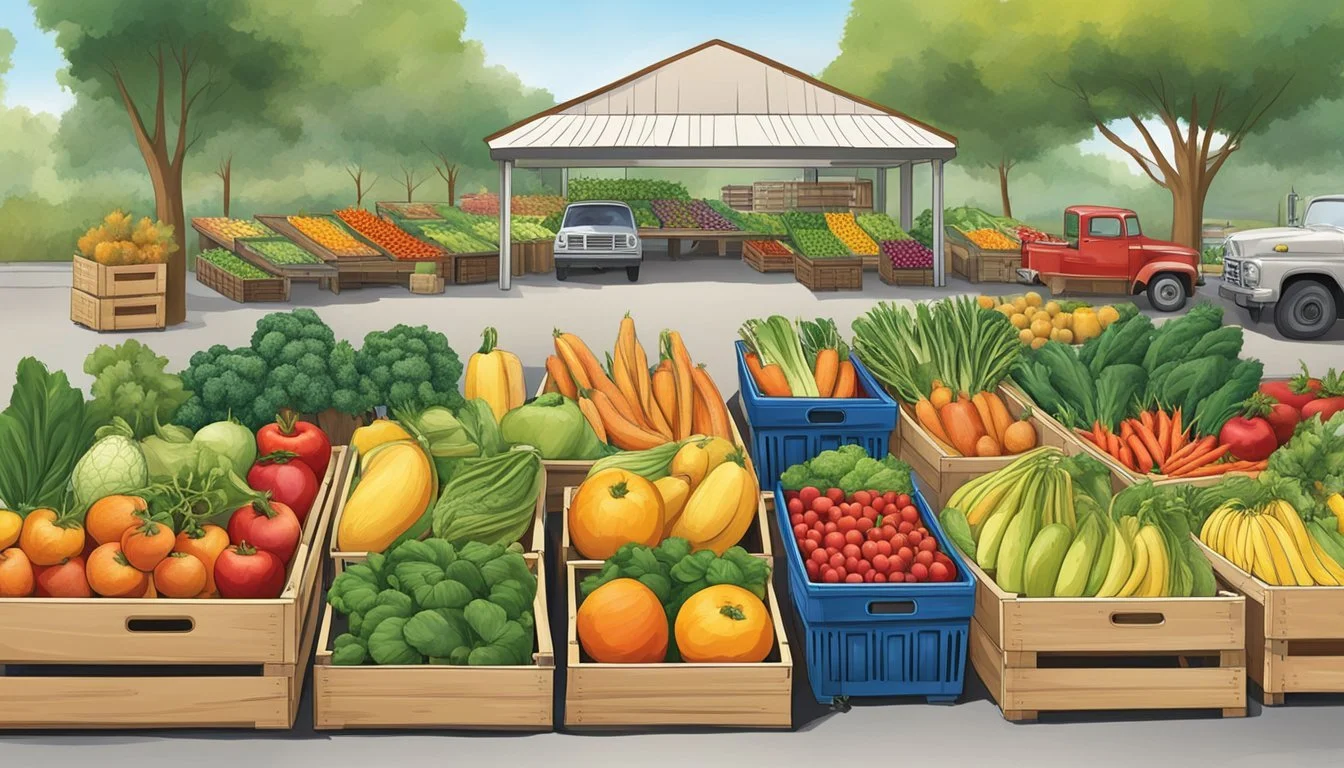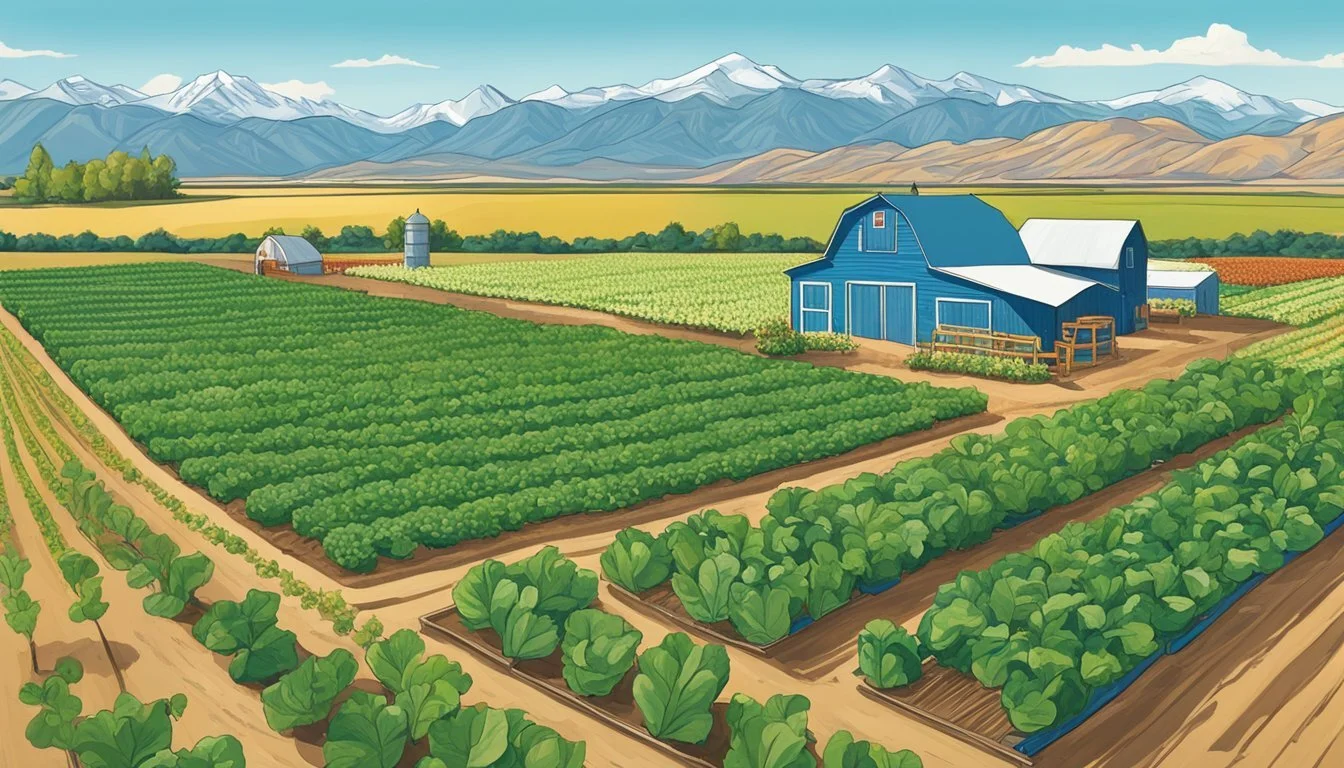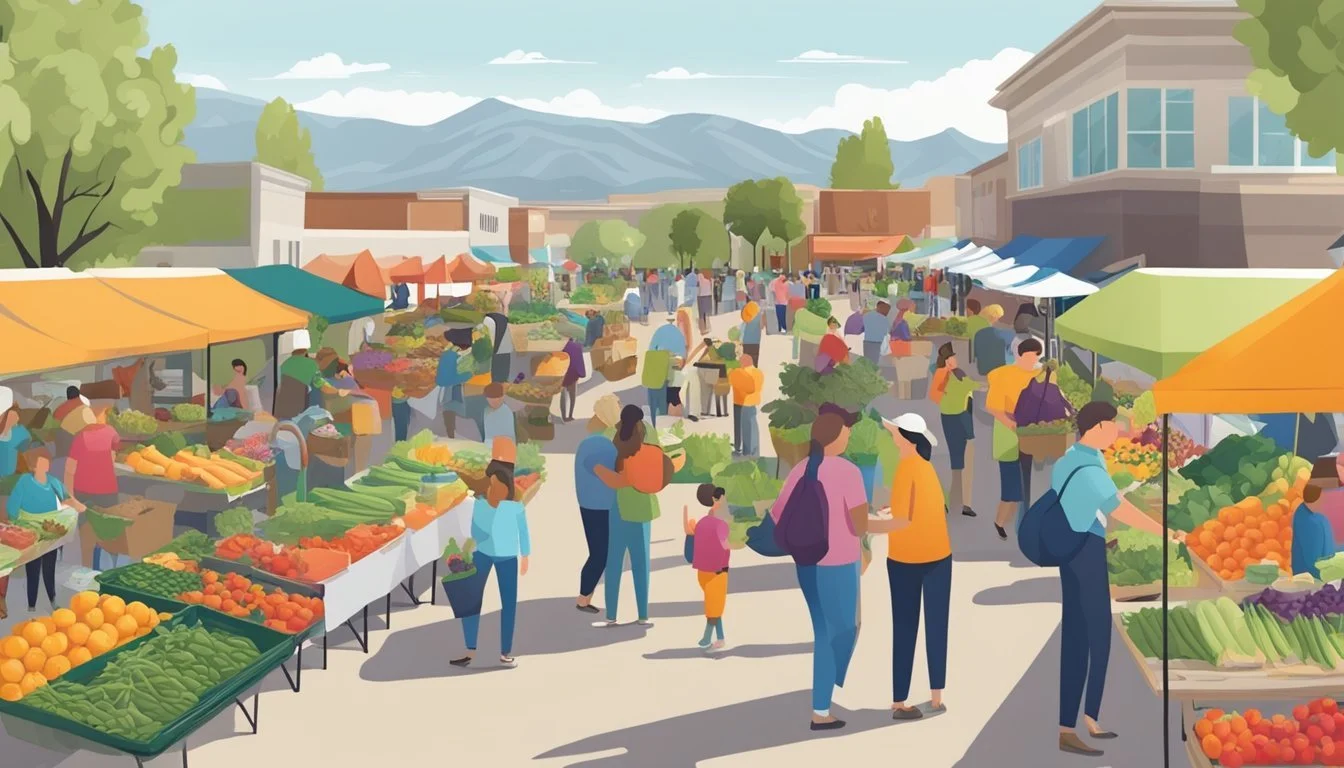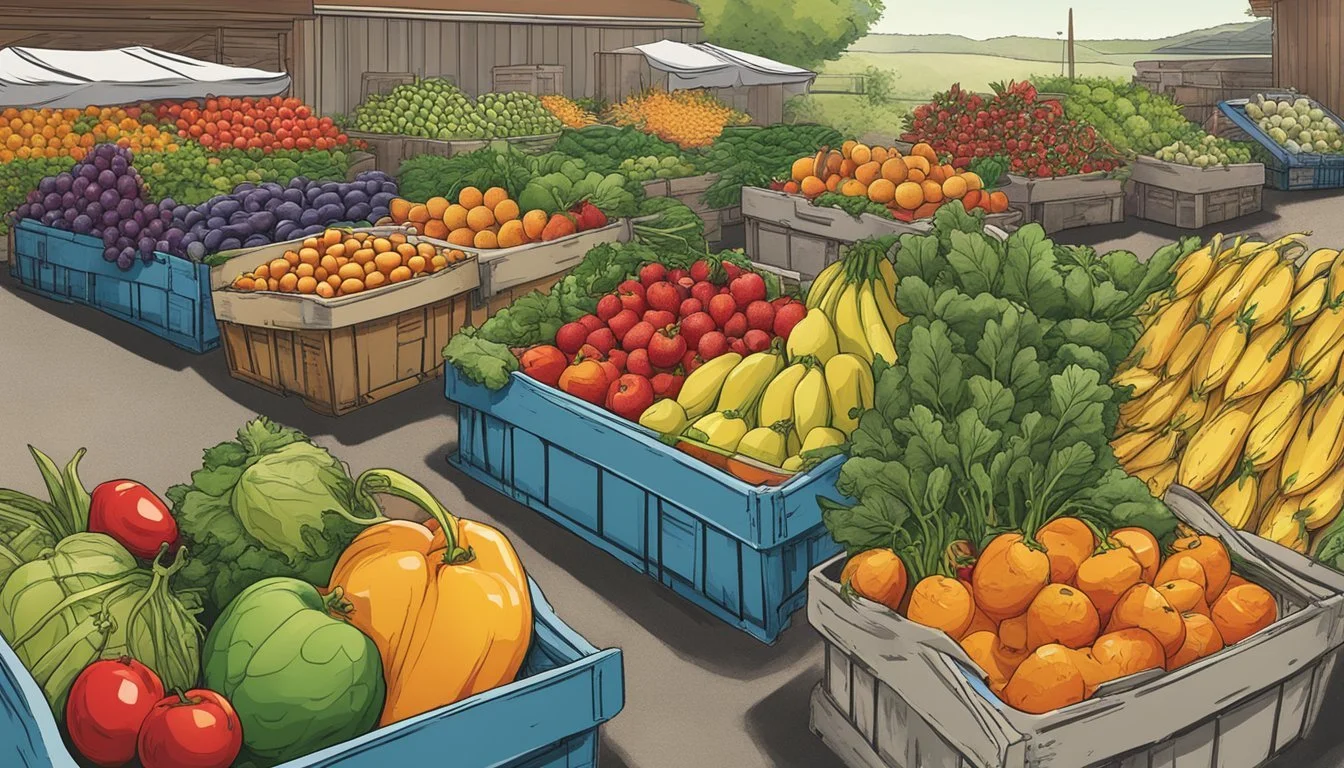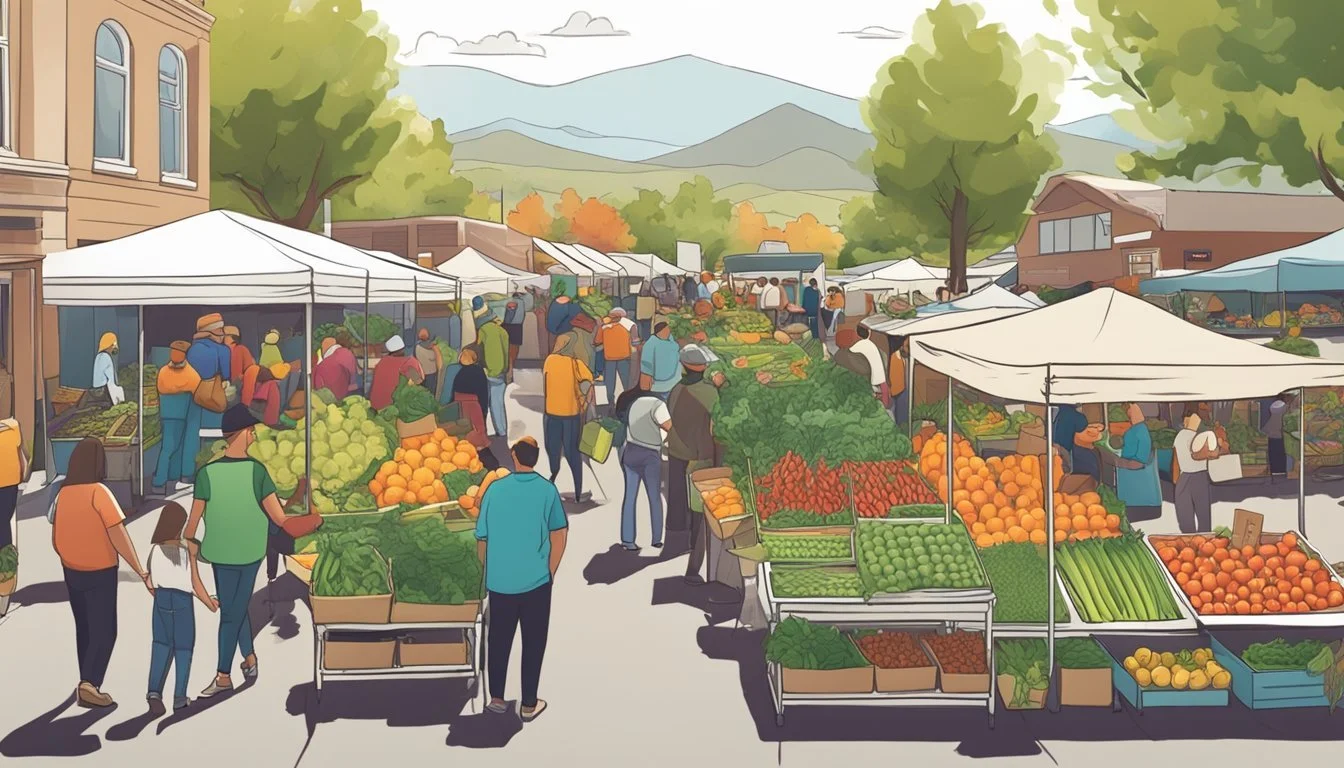Community Supported Agriculture (CSA) in West Jordan, UT
A Guide to Local Farm Shares
Community Supported Agriculture, commonly known as CSA, has rooted itself deeply in the farming culture of Utah, with West Jordan being no exception. This model of food production and distribution connects local farmers directly with consumers. Residents of West Jordan have the opportunity to purchase shares of a farm's harvest, often receiving a variety of fresh vegetables, fruits, and other farm products throughout the growing season. The advantages of CSAs are multifaceted, providing community members with access to fresh, locally-grown produce, while ensuring financial support for small scale producers.
In West Jordan and surrounding areas, several farms have embraced the CSA model. They offer seasonal shares that give consumers a taste of the region's agricultural diversity, from Houdini the staples like greens and herbs to more unique items such as goat cheese and handmade goat milk soap from local producers like Drake Family Farms. This symbiotic relationship between consumer and producer fosters a sense of community and offers a transparent look into food production, which is often missing in traditional retail models.
Utah's commitment to the CSA framework is further supported by initiatives like Utah’s Own, a state-sponsored program by the Utah Department of Agriculture and Food. This indicates a growing interest and state-level support for sustainable agricultural practices. For West Jordan residents, participating in CSA not only means enjoying fresh products but also contributing to the local economy and the sustainability of Utah's agriculture.
Understanding CSA
Community Supported Agriculture, or CSA, represents a model that connects local consumers directly to their food sources by establishing partnerships with local farms. This system reinforces the values of quality, local produce while fostering community support for farming.
Principles of Community Supported Agriculture
CSA operates on a foundational principle where individuals or families invest in a share of a local farm's projected harvest. This upfront support aids in covering the initial operational costs required for the farming season. CSA reflects a shared commitment between the farmers and the community, emphasizing:
Community Engagement: Members form a closer link with their food source.
Shared Risk: Both farmers and consumers share the risks and benefits of food production.
Environmental Stewardship: CSA encourages farming practices that minimize harm to the environment.
Economic Support: Direct investment in local farms stimulates the local economy.
Benefits of CSA for Consumers
Consumers enjoy a plethora of advantages through their involvement in CSA programs:
Access to Fresh Produce: They receive regular distributions of fresh, often organic, produce, which may enhance their health and well-being.
Learn About Food Sources: Consumers gain insights into the origins and methods of food production.
Economic Savings: Although the upfront cost is higher, consumers may save money over time with consistent access to quality produce.
Community Connection: They engage with a like-minded community that values local food systems and sustainable practices.
Benefits of CSA for Farmers
Farmers gain significant benefits from the structure of CSA:
Financial Security: Early season investments by consumers provide farmers with much-needed capital to manage initial costs.
Market Assurance: They gain a guaranteed market for their produce, reducing the risks of overproduction and waste.
Enhanced Focus on Quality: With a secured customer base, farmers can concentrate on sustainable farming techniques that yield high-quality produce.
Community Links: Farmers can strengthen their relationship with local consumers, which can enhance their visibility and support within the community.
By supporting a CSA, individuals contribute to a resilient local economy, gain access to nutritious food, and strengthen the farming community. Farms, in turn, receive the support and financial stability required to continue providing high-quality local produce to their community.
CSA Models and Structures
In West Jordan, UT, Community Supported Agriculture (CSA) models are structured to foster a symbiotic relationship between local farms and the community. These models are based on various share types, distribution methods, and membership details, designed to meet the diverse needs of consumers and support agricultural practices.
Share Types and Distribution Methods
Share Types: CSAs in West Jordan offer a range of share types to cater to different consumer preferences. This typically includes:
Full Shares: Suitable for families, providing enough produce for 3-4 people.
Half Shares: Ideal for small households or individuals, enough for 1-2 people.
Specialty Shares: Often include items like herbs, flowers, eggs, or dairy.
Distribution Methods: There are several methods local farms use to distribute CSA shares:
On-Farm Pickup: Members collect their shares directly from the farm, enhancing their connection to the source of their food.
Delivery: Some CSAs offer home delivery, providing convenience for members.
Drop-off Points: Convenient locations within the community where members can collect their shares.
Membership and Subscription Details
Membership: Becoming a CSA member in West Jordan typically involves:
Commitment to a season, usually ranging from late spring to early fall.
Payment is often required upfront to provide the farm with needed capital.
Subscription: Subscription details can vary from one CSA to another but generally include:
Duration: Most memberships last from 18 to 22 weeks.
Cost: Prices are set based on the type of share, with payment plans available in some cases.
Cancelation/Refund Policy: Terms are usually set at the beginning of the subscription, with some CSAs offering partial refunds under specific conditions.
These models and structures are grounded in the principles of supporting local agriculture while providing quality, fresh products to the community. Consumers engage directly with their food source, and farms receive upfront financial assurance, resulting in a resilient local food system.
CSA Farms in West Jordan
In West Jordan, Utah, residents have access to a variety of Community Supported Agriculture (CSA) farms offering locally produced fruits and vegetables. These farms employ organic practices and offer a direct connection to high-quality produce.
Overview of CSA Farms
Community Supported Agriculture in West Jordan provides a platform for consumers to buy seasonal produce directly from the local farmers. CSA membership typically involves purchasing a share from a local farm, and in return, members receive a portion of the farm's produce throughout the season. Backyard Urban Garden Farms, known locally as B.U.G. Farms, and Petersen Family Farm are prominent CSA providers in West Jordan.
Specialty Products and Offerings
Johnson Family Farms and Borski Farms, among others, offer a range of specialty products through their CSA programs. They curate a selection of fresh, quality produce that often includes:
Fruits: Apples, berries, melons
Vegetables: Tomatoes, leafy greens, root vegetables
These farms often practice organic farming, ensuring their offerings are grown using methods that promote ecological balance and conserve biodiversity.
Visiting and Supporting Local Farms
Residents can support local farms by visiting and purchasing from them directly. 3 Squares Produce and Farmer Next Door are examples of farms that welcome visitors looking for locally produced, high-quality farm offerings. Farm visits not only allow customers to see where their food comes from, but also provide a way to build relationships with the farmers who grow their food.
Environmental and Community Impact
Community Supported Agriculture (CSA) in West Jordan, Utah, presents a significant opportunity for sustainability through organic farming while concurrently strengthening the local ecosystems. These initiatives are deeply intertwined with the environmental and communal health of the region.
Sustainability and Organic Farming
West Jordan's CSA programs place a strong emphasis on sustainable practices by incorporating organic farming methods. This system supports agriculture that eschews synthetic pesticides and fertilizers, reducing harmful runoff and promoting healthier soils. Subscribers to CSA who receive produce directly from the local farms are getting products cultivated with an emphasis on long-term environmental stewardship, demonstrating their commitment to practices approved by the Environmental Protection Agency (EPA).
Organic Techniques Used:
Crop rotation
Green manures and compost
Biological pest control
This commitment to organic and sustainable farming within the CSA framework helps to ensure that the agricultural practices respect the limits of the natural environment and promote biodiversity.
Strengthening Local Ecosystems
CSA operations in West Jordan act as a cornerstone for local ecosystems, creating a symbiotic relationship between the land and its inhabitants. By keeping farming local and reducing the need for long-distance produce transportation, CSAs contribute to a smaller carbon footprint and less environmental stress.
Benefits to Local Ecosystems:
Preservation of local wildlife habitats: Smaller-scale farming practices are less likely to disrupt existing ecosystems.
Soil health: Organic farming practices enrich the soil, increasing its ability to retain water and support varied plant life.
Reduced Carbon Emissions: Less transport equates to fewer emissions, contributing to cleaner air quality.
These ecological enhancements not only aid in stabilizing the local environment but also forge a stronger connection between consumers and the land, informing the community of the very real benefits of sustainable agricultural practices.
Connecting Consumers with CSA
Community Supported Agriculture (CSA) in West Jordan offers a platform for consumers to access fresh, local produce while supporting local farms. This direct farm-to-table approach ensures consumers get the most seasonal items available while fostering a closer connection with the source of their food.
Educating on the Importance of CSA
West Jordan educators and food advocates emphasize the importance of CSA as a sustainable food system. CSA helps to lessen food miles and support economic stability for local farms. Educating the public through workshops and local food events raises consumer awareness and highlights the ecological benefits and freshness of CSA products.
How to Choose the Right CSA
When looking to join a CSA in West Jordan, consumers should search for CSA options that best fit their household's needs. Factors to consider include:
Pick-up location: Proximity to home or work can influence convenience.
Share size: CSA shares can vary, offering single, couple, or family-sized portions.
Product variety: Some CSAs provide a wide range of produce, while others may specialize in certain types of crops.
It is essential for consumers to research and understand a farm's growing practices and to choose a CSA that aligns with their values, whether that's organic practices, non-GMO crops, or conservation efforts. Local CSAs often offer subscription season tours or meet-and-greet events for potential and current members to foster a transparent and trusting consumer-farmer relationship.
Promotion and Marketing
Promotion and marketing strategies for Community Supported Agriculture (CSA) in West Jordan, Utah are multifaceted, focusing primarily on digital presence and mutually beneficial partnerships.
Utilizing Online Platforms
CSAs in West Jordan leverage online tools to enhance visibility and facilitate the sale of shares. They optimize their websites for search engines to ensure potential members can easily find them through search queries. Effective methods include posting regularly on social media about available produce, farm events, and pick-up points, as well as engaging with the community through newsletters.
Search Engine Optimization (SEO): Careful use of keywords related to CSA and West Jordan enhances search rankings.
Social Media Marketing: Platforms like Facebook and Instagram are utilized to showcase fresh produce and share CSA updates.
Newsletter Communication: Regular newsletters keep subscribers informed and engaged with the latest from the CSA programs.
Building Relationships with Local Businesses
CSAs form alliances with local businesses, including restaurants and food companies, to promote their produce. This partnership approach is a strategic element of their marketing plan, as it helps to expand their market reach.
Partnership with Restaurants: Partnering with local eateries that prioritize farm-to-table menus to supply them with fresh, seasonal produce.
Networking with Food Companies: Collaborating with local food businesses can lead to cross-promotions and advantageous synergies.
By actively engaging in online promotion and cultivating local business relationships, CSAs in West Jordan strive to solidify their presence in the community and sustain their operations.
CSA Beyond West Jordan
Community Supported Agriculture (CSA) models from West Jordan are not only nurturing local food systems but also branching out to encompass larger communities within Salt Lake and Summit Counties.
Expansion into Salt Lake and Summit Counties
The proliferation of CSAs in Salt Lake County signifies a growing interest in locally-sourced food beyond the bounds of West Jordan. Notably, cities like Salt Lake City, Murray, and Draper, Utah have embraced the CSA model, with an increased number of farms serving these areas. Salt Lake County alone has become a substantial marketplace for CSA shares, including organic produce, which is frequently distributed at local pick-up points or through direct home deliveries.
Farms in West Jordan have extended their services to meet the demands in neighboring Summit County, including affluent areas such as Park City. This expansion reflects the scalability of CSAs and their adaptability to different community needs. The influx of CSAs serving these regions underscores the movement's adaptability and the consumers' growing preference for fresh, locally-grown produce.
Collaboration with Neighboring Cities
West Jordan CSAs are fostering partnerships with various cities within the counties to ensure a robust local food network. This includes collaboration with:
Bountiful: Partnership for cross-promotion of local food events.
Holladay and Fairfield: Joint CSA programs that benefit from shared distribution channels.
Riverton: Shared community gardens and educational workshops geared towards sustainable agriculture.
These collaborative efforts not only extend the reach of West Jordan's CSA but also strength connections with neighboring communities, reflecting a shared commitment to sustainable community-based food systems. Through such partnerships, West Jordan CSAs are setting an example of community cohesion and joint efforts in local food sustainability.
Contact and Participation Information
Residents in West Jordan, Utah interested in participating in Community Supported Agriculture (CSA) have several options to choose from. By engaging with local CSA programs, members can support Utah farmers while enjoying fresh produce. Below, find the relevant contact information for starting or continuing your CSA participation.
Petersen Family Farm
A notable farm offering CSA shares in the area is Petersen Family Farm located in Riverton, UT. Interested parties can contact them for the freshest seasonal produce.
Phone: Not provided
Website: Petersen Family Farm
Farmer Next Door
This CSA provider services several neighboring communities, including West Jordan. They offer sustainably grown fruits and vegetables with convenient pick-up points across the region.
Phone: 801-703-7871
Website: Not provided
Fairfield Inn Farms
Located in Bountiful, a short drive from West Jordan, they provide a range of farm products for locals looking to support community agriculture.
Phone: 435-630-6587
Website: Not provided
Participation typically implies purchasing a share at the start of the growing season, which translates into weekly deliveries or pick-up of produce. Consumers looking to partake should reach out directly through provided contact methods. They are encouraged to visit each farm's website or make a phone call for detailed information on share sizes, pricing, and the signup process. Supporting CSA not only contributes to local agriculture but also helps connect communities with the rhythms of natural, seasonal farming.

